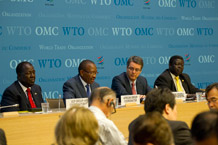 |
| Source: here |
Flanked by representatives from Kenya, Lesotho and Uganda, WTO's Director-General Roberto Azevêdo, launched the TFAF, a scheme designed to help least-developed countries (LDCs) and developing countries implement the Trade Facilitation Agreement. [Over 70% of the LDCs are from the African continent] The TFAF addresses one of the initial concerns that LDCs and developing countries won't be able to cope with the TFA.
What is the TFA
"The TFA contains provisions for faster and more efficient customs procedures through effective cooperation between customs and other appropriate authorities on trade facilitation and customs compliance issues."
Deadlines set for WTO members
- 31 July 2014 - adopt the protocol transposing the TFA in WTO law, after which the TFAF would become operational
- December 2014 - work programme leading to the conclusion of the Doha Development Agenda (DDA)
- End of December 2017 - deal with the issue of food security
Are all WTO members happy with the TFA?
 Notably, India isn't happy because of food security concerns. The Asian powerhouse wants to be able to substantially subsidise its farmers and hold food stockpile for its growing population. [Here is a neat summary of what India wants (also here) want and why]
Notably, India isn't happy because of food security concerns. The Asian powerhouse wants to be able to substantially subsidise its farmers and hold food stockpile for its growing population. [Here is a neat summary of what India wants (also here) want and why]
To avoid being "misquoted" by the media, the Indian Government issued a press release to reiterate its position. It states: “Till we have an assurance and visible outcomes which convince developing countries that Members will engage in negotiations with commitment to find a permanent solution on public stock holding and all other Bali deliverables, especially those for the LDCs, India will find it difficult to join the consensus on the Protocol of Amendment.” [India seems to be speaking up for the LDCs who, as some argue, could suffer from cheap imports from everywhere - perhaps, including India]
On the other hand, leading economies such as the U.S. and the 'EU + others' are definitely not happy with 'India and co' - though they didn't name anyone. Whilst the U.S.' was a bit diplomatic, the EU had some strong words for those in dissent:
"...Without adoption of the Trade Facilitation Protocol by July 31 a great opportunity to mobilise trade as an instrument for growth and development would be lost, and the credibility of the WTO, which has during the financial crisis proven its value as a firewall against protectionism, would be further damaged. [Deadline is just 48 hours away. Can a deal be reached?]
 |
| Source: here |
We must respect the decisions taken by Ministers in Bali. The EU is not ready to renegotiate basic elements or timelines that were agreed as integral part of the Bali package. The EU is ready to work with all members to find a solution by the 31 July for Trade Facilitation and to intensify work for satisfactory and timely progress on all aspects of the Bali Ministerial decisions in accordance with the mandate. [India, turn if you want; The EU's not for turning. Well, let's see. 'India and co.' wants the issue of food security discussed and dealt with now!]
We call on all WTO members to use the remaining time until the 31 July to adopt the TF protocol, opening the door for the other issues agreed in Bali, for the conclusion of the DDA, and giving a new perspective to the WTO and the multilateral trading system..." [Bilateral or regional trade deals, the best way to go from now on?]
Commentary
In its piece in 2012, the ICTSD somewhat predicted that this would happen. When this Leo thinks of the technical assistance provision in the TRIPS Agreement, he can only but hope that the WTO would make this TFAF work properly - that's if they get a deal done by the 31st.
Is this really a huge blow for the WTO and/or multilateral trade negotiations? Time will tell.
-----







2 comments
Write commentsAddendum:
ReplyIn respect of the TFAF, we might see increased technical assistance and capacity building in the area IP enforcement.
Customs & border officials could receive more/enhanced training and/or tools to deal with IP infringement. One of the tools might be something like the U.S. Customs & Border e-Recordation system https://iprr.cbp.gov/. Having it in place is one thing, effective implementation is another.
As a whole, the TFA is also good news for IP rights holders.
Further texts found on Trade Facilitation & Developing Countries:
(1) http://www.nottingham.ac.uk/credit/documents/papers/08-05.pdf
(2) http://worldcustomsjournal.org/media/wcj/-2008/1/customs_and_trade_facilitation_from_concepts_to_implementation.pdf
Nice blog and good information shared here.
Reply